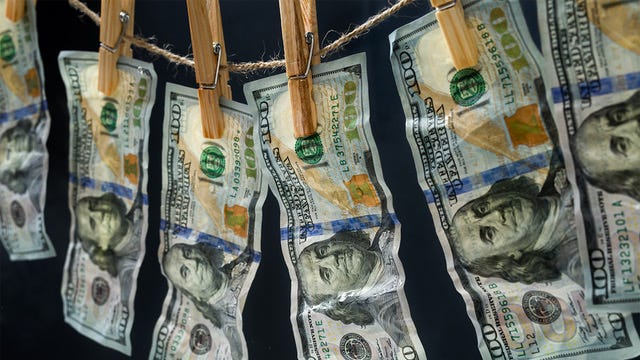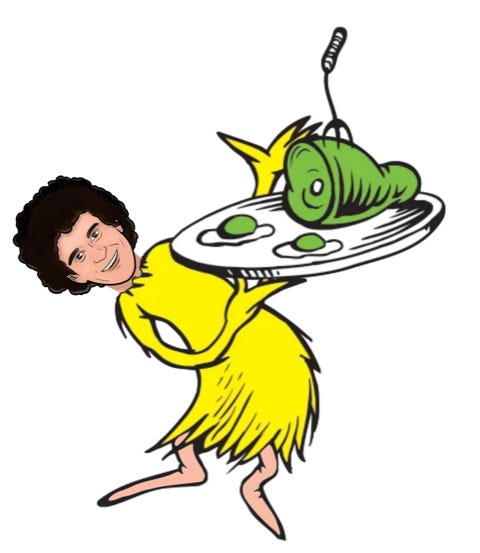Sam I Am
“That Sam-I-am!
That Sam-I-am!
I do not like
that Sam-I-am!
Do you like green eggs and ham?
I do not like them,
Sam-I-am.
I do not like
green eggs and ham.” – Dr. Seuss
Let’s do a thought experiment, shall we? Imagine that a pharmaceutical company – call it Seuss Pharma – invents a drug derived from the extract of green eggs. While the drug has unique and beneficial impact for people suffering from extreme migraines, the real and unofficial use case for it is found among young party-goers. You see, when you take the green eggs drug, all your stress dissolves. Parties are more fun. Life is more fun. Living is more fun.
But school work is decidedly not more fun.
And therein lies the problem with Seuss Pharma’s green eggs drug. It destroys the capacity for people to work – especially young people. So much so that the US Federal and Drug Administration has essentially outlawed it except for the narrowest of use cases tied to extreme migraines with medical supervision. After some push-back, Seuss Pharma does comply with US law, pulling their drug from all over-the-counter point-of-sale locations and making it harder (but not impossible, wink, wink) to procure it over the internet from US-based IP addresses. It’s a completely different story overseas.
Overseas, things are much looser. Many countries welcome the green eggs drug – maybe the rulers of these countries see a restless population of young people looking to rebel and the drug takes the edge off. Maybe some countries are corrupt. It doesn’t really matter why. Seuss Pharma is pressing its edge to the maximum in these countries and making serious bank. While treating migraines is still the cover story for Seuss Pharma, the drug is also sold to distributors who formulate it into chocolate bars and other delicious treats that are then marketed directly to young adults, using the best targeted spyware techniques money can buy. Naturally, demand is off the hook.
You might imagine that it would be difficult for Seuss Pharma to raise money from US-based investors, especially the blue-chip Silicon Valley venture capital firms and the big names on Wall Street. After all, everybody knows what’s really going on here. Sure, Seuss Pharma is narrowly operating within the letter of US laws, but it is essentially flouting the spirit of them. The green eggs drug is bad! It harms young people! Surely, no clean money would want part of that action, right?
[Pauses for a deep and thorough belly laugh…]
Wrong.
Ask yourself a question: when was the last time an arms-length investor in a questionable enterprise got in trouble for things that enterprise did? I can’t think an example. Maybe there are a few, but typically when a company gets in trouble for skirting laws, the blame falls on the founders and senior management. The investors might lose some money, maybe even all their invested money, but rarely do they lose their freedom. In today’s market when operating outside the law is lauded as innovation, the company likely gets away with it and the investors can experience huge windfall gains. From the investor perspective, it’s a risk/reward deal worth making, as long as they are willing to look the other way.
Ask yourself another question: why is money laundering a thing? Money laundering is a thing because skirting laws is usually extremely profitable. Bribery is profitable. Selling weapons to despots is profitable. Tax evasion is profitable. Selling illegal and addictive drugs is profitable. There are laws against these things, of course, but people will happily break those laws if they can get away with it because the cash is so good – and there’s the rub. Illicit gains are becoming ever-more difficult to spend in today’s economy, mainly because of strict anti-money laundering (AML) and know-your-customer (KYC) laws in the proper banking system. In a way, AML/KYC laws are foundational to a just society because they make reaping the rewards of illicit behavior more difficult.
Which brings us to the big news of the week. Doomberg’s new favorite friend – Sam Bankman-Fried – has been busy bringing in money from investors for his cryptocurrency exchange FTX. Here’s how the Wall Street Journal reported it (emphasis added, photo credit to Anthony Kwan):
“Cryptocurrency exchange FTX has raised money at an $18 billion valuation, a deal that shows investors’ enthusiasm for digital currencies even after a crash that erased half of bitcoin’s value over the past three months.
FTX raised $900 million in a new funding round that closed Tuesday. Participants in the round included Japanese technology investor SoftBank Group Corp., Silicon Valley venture-capital firm Sequoia Capital and Third Point, the hedge fund led by billionaire Daniel Loeb, FTX said.
The transaction vaulted FTX into the ranks of the world’s highest-valued crypto companies. It also provided a measure of mainstream acceptance for FTX, which bars Americans from trading on its main marketplace to avoid running afoul of U.S. regulators. FTX’s main office is in Hong Kong and its parent company, FTX Trading Ltd., is domiciled in Antigua and Barbuda.”
Nice of the Wall Street Journal to leave out just how Sam’s main marketplace – the heart of FTX’s business – runs afoul of US regulators, or why such a sterling list of blue-chip investors seem comfortable with it. Maybe it’s because FTX has weak AML/KYC controls overseas? Or effectively none? Maybe the Journal might have inquired with Softbank, Sequoia, or Third Point why they were so anxious to invest in such an enterprise?
Just kidding.
In the course of writing Doomberg, I’ve gotten to know – to the extent that two anonymous people can get to know each other – the person behind the Twitter account Bitfinex’ed (@Bitfinexed). Bitfinex’ed is a prolific and effective critic of much of the crypto space. In particular, the account has been one of the driving forces in exposing the issues behind tether. Needless to say, @Bitfinexed is a must-follow. While you’re at it, give your favorite chicken a follow at @DoombergT.
We recently had a direct message exchange about AML/KYC in the crypto world. This was not a conversation about FTX per se, although I’m convinced the principles apply nonetheless. I’ve reproduced some of those comments here, with permission:
“Here’s a classic observation. Exchanges with weak or no AML/KYC often see significant volume. When exchanges that formerly had weak AML/KYC strengthen their policies, volume vanishes… There’re two reasons for the critical importance of no- or weak-KYC/AML. The first reason is money laundering. Chinese money laundering cannot perform KYC/AML. The second is market manipulation. If you want to manipulate a market and pump-and-dump an endless amount of shitcoins, you want hundreds of accounts none of which have your names on them.”
Are Softbank, Sequoia, and Third Point underwriting a buffet of green eggs and ham?
Ask Sam.
If you enjoy Doomberg, subscribe and share a link with your most paranoid friend!






I'm here from the future in November 2022. Let's just say where you had smelled smoke in July 2021, there was fire.
FTX does have KYC/AML for anyone wanting to play with any meaningful amount of money. If I recall, their daily withdrawal limit for NON-KYC account is $900 per day which is negligible in the grand scheme of crypto things.
I suppose you can create 10,000 accounts and get a collective $9 million per day withdrawal limit but I don't think that's how crooks do it. What the crooks do is buy an already KYC/AML passed account from the dark web, and launder funds effortlessly because an KYC/AML passed account has an unlimited withdrawal limit.